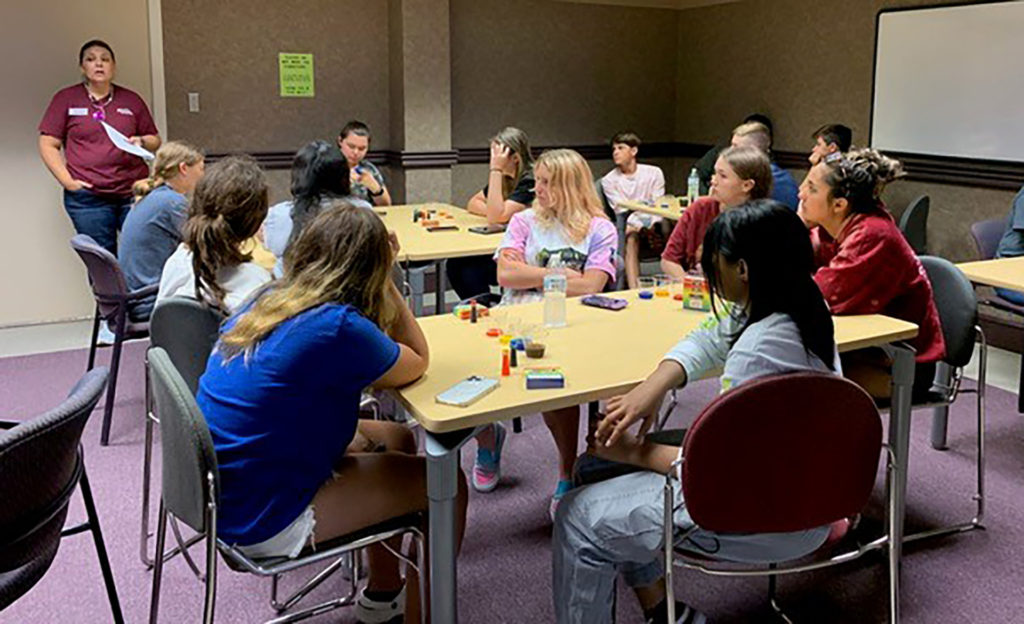Veterinary Science Certificate Program garners grants for youth education
Funding promotes One Health approach, food animal medicine
The Veterinary Science Certificate Program, VSCP, of the Texas A&M AgriLife Extension Service, in collaboration with partners, has received two grants this year, one to educate youth on the One Health approach and one to educate on food animal medicine.

The Veterinary Science Certificate Program is a nationally recognized program designed for high school students interested in becoming a veterinary assistant. Participating students are typically interested in pursuing an associate, undergraduate or graduate degree in the veterinary science field.
The first grant, $74,989 from the Council of State and Territorial Epidemiologists, CSTE, Influenza and Zoonoses Education among Youth in Agriculture Program, was awarded in May.
The second grant, a U.S. Department of Agriculture National Institute of Food and Agriculture Veterinary Service Grants Program, VSGP, was awarded in the amount of $197,447 at the end of August.
“I am ecstatic to be able to provide these grants and the opportunity to students who would otherwise not have access to veterinary medicine education during high school,” said Nikki Boutwell, VSCP coordinator, Bryan-College Station. “I honestly believe this grant will change the lives of the students who embark on this journey with the VSCP staff.”
Council of State and Territorial Epidemiologists grant
The AgriLife Extension VSCP consortium partners for this grant include the Institute for Infectious Animal Diseases, the Texas Department of State Health Services, DSHS; the Zoonosis Control Branch, Texas Animal Health Commission, TAHC; and private veterinarians from across Texas.
Susan Culp, DVM, previous VSCP coordinator and project contributor to the grant, said this grant has multiple purposes.
First, grant funds will be used to educate youth on the One Health approach that is needed to prevent, detect, control and respond to zoonotic and emerging infectious diseases, ZEID, using a multidisciplinary approach.
The second goal is to provide ZEID education to youth and their families who have frequent contact with specific agricultural groups, such as producers, 4-H and FFA organizations, veterinarians and the animal industry.
This year, the zoonotic disease materials were presented at five overnight veterinary science camps at Texas A&M University-Kingsville, Texas A&M University, Tarleton State University, West Texas A&M University in Canyon and Lone Star College, Houston. Additionally, the program was implemented at three day camps in McMullen and El Paso counties. In 2022, the One Health educational program reached 176 participants.
The approximate $75,000 award to the VSCP is a one-year award, and a sustainability roadmap is being developed to continue offering this One Health education at all future overnight and day camps offered by the VSCP, Boutwell said. Sustainability plans also include the possibility for expansion to other states in future years.
“We are grateful to have been awarded this grant by the Council of State and Territorial Epidemiologists,” Boutwell said. “This grant will allow our staff to incorporate One Health education into all our youth events. We are hopeful that educating them about zoonosis and preventing disease spread will allow them to be proactive in their daily lives and community.”
Serenity Campbell, a Tahoka High School senior, who heard Boutwell and Culp talk about One Health while attending the Tarleton State University VSCP Camp, said she determined that veterinary science is the career she wants and will study in college.
“People who help protect humans, animals and all environmental health use this method to achieve the best health outcome,” Campbell said. “I believe teaching students about this topic can make a difference in the future and improve our world in ways no one would imagine.”
USDA Veterinary Service grant
The USDA Veterinary Service Grants Program-funded project will increase youth awareness by exposing students in grades 11 and 12 to education and career opportunities in food animal medicine.
Through this project, VSCP will collaborate with key school personnel, home-school organization and parents, as well as 4-H/FFA members to provide distance education for students in areas that do not have access to education in veterinary medicine through traditional high school career education programs.
Students in grades 11 and 12 who do not have other forms of educational access will be awarded one entire course of the Texas A&M AgriLife Veterinary Science Independent Study Curriculum at no charge to the student or school system. This course is designed for independent student learning and administered by VSCP program staff.
Students enroll and complete 100 lesson modules at their own pace. Each lesson module includes a veterinary science lesson, a prerecorded teacher-led video, printable note sheets, an automated quiz and an activity to be submitted online. Progress is tracked by VSCP staff, and monthly check-in meetings with each student will occur on a one-on-one basis.

This curriculum, coupled with hands-on practical experience, prepares the student to earn a certificate of completion, Boutwell said. This veterinary assistant certificate is issued by VSCP.
Launched on Sept. 16, 11 students have already qualified to enroll in this first year of the grant. The grant is a three-year program. Enrollment will be open to 30 students in year one, 45 students in year two, and 25 students in year three.
Student recipients will be encouraged to remain in contact with program personnel after the conclusion of the grant period to provide career updates after one year, five years and 10 years. A sustainability model to continue this project after the conclusion of the grant will be pursued.
“What better way to attack the shortage area of veterinarians than allowing students at a young age to get involved and start their education journey during high school,” Boutwell said. “This grant will give those students who are already lacking services a springboard to the veterinary field. I believe building these relationships and assisting these students will be a great way to help them pursue veterinary medicine as a profession and eventually give back to the communities they come from that are underserved. I look forward to following the path and checking in with these students in the next few years.”
Steven Perez, the first awardee to receive the USDA NIFA VSGP grant, is a senior at Rio Grande City High School who is involved in 4-H and FFA. He attended the McMullen County Veterinary Science Day Camp in Tilden and was excited to learn about the VSCP program.
“Being accepted into the VSCP program will pave the way for me to learn much more about veterinary science,” Perez said. “This will truly enhance my opportunities as I work towards achieving my goal of becoming a veterinarian.”


